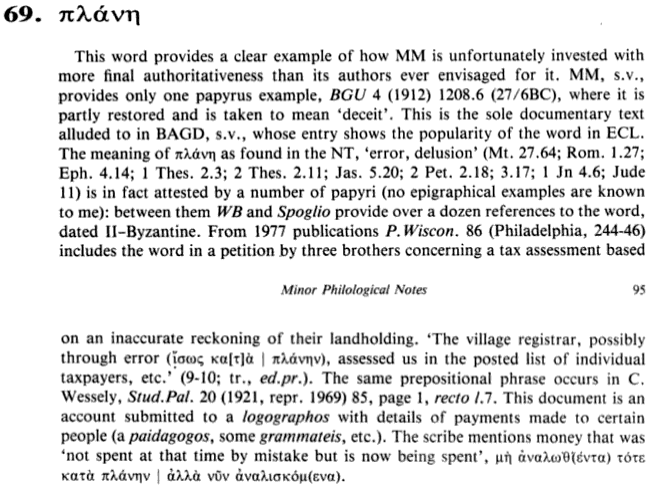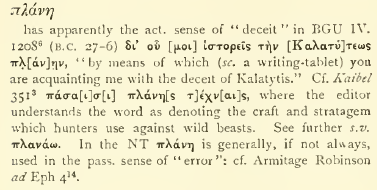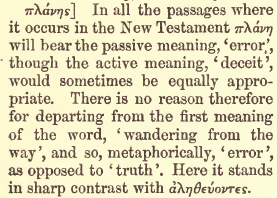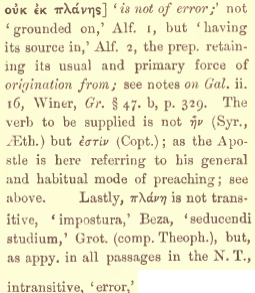 In my last post ‘Philip Payne, οὐδέ, and Galatians 1 vv 16-17’ I gave one example of how Philip Payne supports his thesis that Paul ‘typically uses οὐδέ to convey a single idea’. His purpose appears to be to prove that:
In my last post ‘Philip Payne, οὐδέ, and Galatians 1 vv 16-17’ I gave one example of how Philip Payne supports his thesis that Paul ‘typically uses οὐδέ to convey a single idea’. His purpose appears to be to prove that:
διδάσκειν δὲ γυναικὶ οὐκ ἐπιτρέπω, οὐδὲ αὐθεντεῖν ἀνδρός.. [1 Timothy 2 v 12a]
does not mean:
I do not permit a woman to teach, nor to exercise authority over a man..
but rather (and I quote) ‘simply prohibits women from assuming for themselves authority to teach men’, so that in fact they are quite at liberty to teach in the church of the Lord Jesus Christ, so long as ‘their authority is properly delegated, not self-assumed’ [Payne, ‘1 Tim 2.12 and the Use of οὐδέ’, p. 253].
One apparently clear counter-example to Payne’s thesis is 1 Thessalonians 2 v 3, which reads:
ἡ γὰρ παράκλησις ἡμῶν οὐκ ἐκ πλάνης οὐδὲ ἐξ ἀκαθαρσίας οὐδὲ ἐν δόλῳ,
For our exhortation does not come from error or impurity or by way of deceit; [NASB]
For our appeal does not spring from error or impurity or any attempt to deceive, [ESV]
For our exhortation was not of deceit, nor of uncleanness, nor in guile: [KJV]
Paul says first of all that their appeal does not derive from error (ἐκ πλάνης); second, that it does not stem from impurity or uncleanness; and third that they are not engaged in deceit or trickery. To be sure, there may be a sense in which all three elements add together to form a single idea – one might say, for example, that the overall message is that the apostle’s ministry is trustworthy – but this is not the sort of synthesis that Philip Payne is claiming for 1 Timothy 2:12. If οὐδέ does what Payne claims, then Paul would be saying here that their exhortation could well be erroneous and it might also be impure or even deceitful, but they could be reassured that it wasn’t all three of these combined together!
So how does Philip Payne deal with this verse? Here is what he says [p. 241]:
He chooses a translation that fails to distinguish clearly between the first element (ἐκ πλάνης) and the third (ἐν δόλῳ). First, it does not translate the change in preposition from ἐκ (from, out of) to ἐν (in, with, by). Second, it chooses a meaning for πλάνη – ‘deceit’ – that is rather close to its rendition of δόλος – ‘trickery’. Payne takes this further by saying that both words ‘commonly’ mean the same thing, ‘deceit’ and he cites the BDAG Lexicon in support. He points out that ἀκαθαρσία can refer to impurity of motive, and then suggests that both deceit and impurity of motive can be seen as aspects of impurity of intent. This seems doubtful since there is surely a distinction between the way in which something is done and the reason for doing it. Finally, he tries to classify this scripture within the classification system that he himself has concocted, and finds himself unsure where to put it. He does admit the possibility that ‘three distinct ideas’ are in view, but he gives no category number for that because he seems to have made an a priori decision not to create one. Before examining the individual scriptures he claimed [p.237] that:
Naturally, if he has not created a category for cases where οὐδέ joins more than one distinct idea, then these will be ‘hard to classify’. An unwary reader may feel that there is something untoward or strange about the holy scriptures which Payne is classifying, rather than something untoward or strange about the categories which he is imposing upon them.
Now observe also where the reader has been left in his understanding of the verse. Applying the definitions of the three Greek terms that Payne has supplied or suggested, it now reads:
‘For our appeal does not spring from deceit οὐδέ impure motives οὐδέ deceit.’
If οὐδέ means ‘nor, and not’, as the lexicons and grammars say it does, then this sentence does not make any sense, for one can’t say that ‘our appeal does not come from deceit or from deceit’. Therefore the reader, consciously or unconsciously, will begin to think or feel that οὐδέ must in fact have some other meaning or force.
Is Philip Payne correct in proposing that ἐκ πλάνης means something similar to ἐν δόλῳ? Using the same dictionary (BDAG) that he refers to, here are the definitions of πλάνη and δόλος:
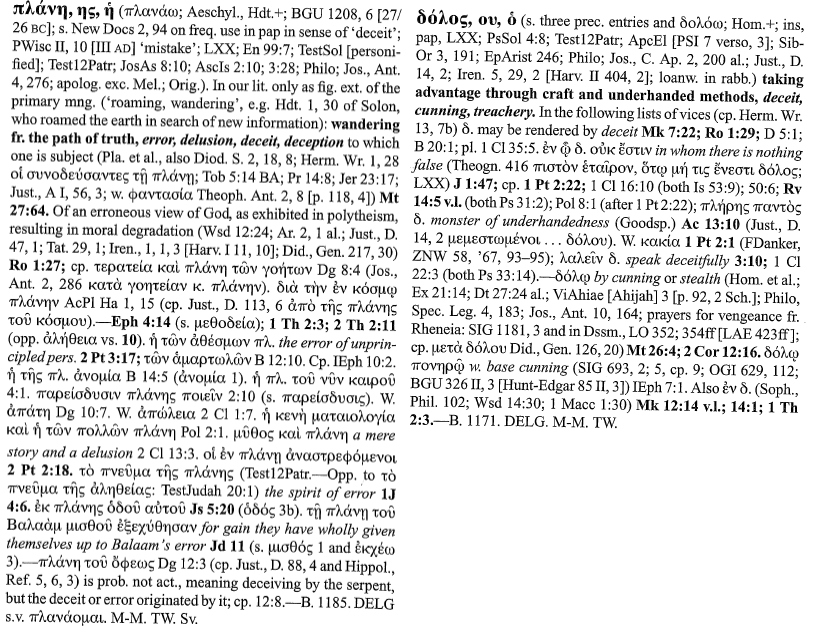
The words in bold Roman type are BDAG’s definitions of the word. πλάνη is defined as ‘a wandering from the path of truth’, whereas δόλος is defined as ‘taking advantage through craft and underhanded methods’. The distinction is clear between being in error oneself and deceiving others. The words in bold italics are suggested translation equivalents. For πλάνη they are given as ‘error’, ‘delusion’, ‘deceit’ and ‘deception’, followed by the qualifying ‘to which one is subject’, which makes it clear that the word concerns being in error oneself either through wandering off course or through being deceived by another. Incidentally, the planets derive their name from their apparent wandering about the sky and the cognate word πλάναω (planaō) which can bear the meaning ‘to wander about’.
In the BDAG entry for πλάνη, following these translation equivalents, there are several examples of its use in the bible and in Greek literature. It is used of ‘an erroneous view of God’, of ‘the error of unprincipled persons’, of ‘a story and a delusion’, of ‘the spirit of errror’, and of ‘Balaam’s error’. Finally, Danker (the editor of BDAG) gives his opinion that in the Epistle of Mathetes to Diognetus, Chapter 12, πλάνη τοῦ ὄφεως ‘probably’ does not have the active meaning of the deceiving by the serpent, but refers to ‘the deceit or error originated by it’. In this last phrase I think Danker must be using ‘deceit’ to refer to the content of the deception rather than the act of deceiving, which is what he thinks πλάνη probably does not mean here.
How then can Philip Payne justify citing BDAG in support of his claim that πλάνη ‘commonly means deceit’, when the BDAG entry so clearly and strongly points towards the meaning of error or delusion? One possibility is that he was relying on a reference within the first parenthetical portion of the entry, which (expanded) reads ‘see New Documents 2,94 on frequent use in papyri in sense of “deceit” ‘. This does appear at first sight to provide some basis for Payne’s claim, but if that was indeed what he was relying on, then surely it behoved him to check the reference to see what it said. Here is the passage in G. H. R. Horsley’s ‘New Documents Illustrating Early Christianity’ Vol. 2, 1982, 94-95:
Horsley says that there is just one example from the papyri where πλάνη has been taken to mean ‘deceit’, but that there are a number of papyri which attest to what he believes is the New Testament sense of the word, namely ‘error, delusion’, and he gives such two examples where he renders the word ‘error’ or ‘mistake’. It would appear therefore that BDAG’s citation of Horsley is incorrect. I raised the matter on the B-Greek forum and one of the academics there confirmed that it ‘looks like Danker misread the entry in New Docs.’ (http://www.ibiblio.org/bgreek/forum/viewtopic.php?f=6&t=2372). There is therefore no remaining justification for citing BDAG in support of a claim that πλάνη commonly means deceit.
Here is the entry in Moulton and Milligan (MM) to which Horsley referred:
As well as the example from the papyrus BGU 1208 (which may be known to some readers because of the occurrence of the word αὐθεντέω in it), Moulton and Milligan give a further example from an inscription where πλάνη has been understood to have an active sense, this time of ‘craft and stratagem’. Since they give no other examples, one can see how, as Horsley implies, some may have taken this entry to mean that πλάνη has the active sense of deceit in the papyri and inscriptions. Horsley’s counter-examples serve to correct that impression. Also, note that Moulton and Milligan did not consider that the evidence they present should cause us to understand πλάνη in the New Testament as meaning ‘deceit’ rather than ‘error’.
Their reference to Armitage Robinson is helpful as he makes an important point in his commentary on Ephesians at 4 v 14 [London 1909, p. 185]:
When either meaning is possible, Robinson proposes, it is preferable to stay with ‘the first meaning of the word’, namely ‘wandering from the way’ and so ‘error’. Most commentators agree. Here is Charles Ellicott [Thessalonians, London 1866], p. 17:
As Ellicott says, Henry Alford takes ἐκ to mean ‘having its source in’ [Greek Testament, 4th ed, 1865, p. 254], and he judges that ‘πλάνης here probably [means] error’. George Findlay [Thessalonians, Cambridge University Press, 1898, p.63] renders ‘is not of error’ and goes so far as to say that the Authorised Version’s ‘deceit’ is ‘incorrect’:
James Frame in the International Critical Commentary [T&T Clark, 1912, p. 95] writes:
He prefers the meaning ‘from delusion’ or ‘error’ precisely because it is sufficiently distinct from the meaning of ἐν δόλῳ to make sense of the clause as a whole. He knows what οὐδέ means and judges it unlikely that Paul would be saying ‘not from deceit.. nor by deceit.’ Charles Wanamaker [New International Greek Testament Commentary, 1990] renders ‘from error’ and argues in the same way as Frame:
Gordon Fee [New International Commentary on the New Testament, 2009, pp. 59-60] understands Paul’s emphasis as being upon his appeal’s source, its motive and its manner:
As Fee understands it, Paul is making three distinct denials about his appeal, and I think it is fair to say that the preponderance of commentary points in the same direction. This not to claim that there is unanimity. Thus Fee’s note 28 reads:
It is hardly clear what Bruce means by ‘not deceived, nor deceiving’. If we are ourselves deceived, then we may deceive others without any intention to do so. This is not deceit, in the normal sense of the word.
In Proverbs 14 v 8, the Hebrew word מִרְמָה meaning ‘deceit, treachery’ was translated in the LXX by ἐν πλάνῃ, which could provide evidence that πλάνη could bear that meaning. On the other hand, the Septuagint translators were not always literal and neither Brenton’s translation of the Greek text ‘the folly of fools leads astray’, nor the recent NETS translation ‘the folly of fools misleads’ convey the sense of the deliberate deceiving of others that we mean by ‘deceit’. Presumably, Brenton and the NETS translators judged that there were insufficient grounds to depart from the normal meaning of πλάνη. Liddell and Scott, the primary classical lexicon do not give deceit as a sense of the word:
I rest my case. My purpose is not to prove absolutely conclusively that ἐκ πλάνῃ has to mean ‘from error’ in 1 Thessalonians 2 v 3. My intent is to show that Philip Payne is basing his case for a previously unknown sense of the conjunction οὐδέ on tenuous readings of scripture. In this case, it seems to me almost certain that:
ἡ γὰρ παράκλησις ἡμῶν οὐκ ἐκ πλάνης οὐδὲ ἐξ ἀκαθαρσίας οὐδὲ ἐν δόλῳ,
should be understood along the lines of:
For our exhortation does not come from error or impurity or by way of deceit;
and that Paul is using οὐδέ to connect three distinct assertions about the source and manner of his appeal to the Thessalonians.
Andrew


